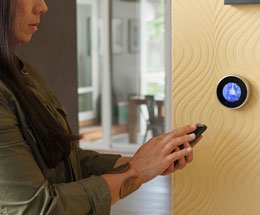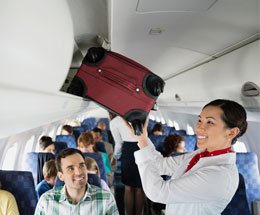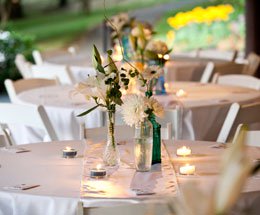
by Flagship Staff | Jul 10, 2018 | Blog
While summer is a great time to enjoy many outdoor activities, it can take a toll on our pocket books because of increased utility costs. Air conditioning units and dehumidifiers are working overtime to keep our homes comfortable. With the kids home from school, electronic devices are used more often, and family vacations can lead to more laundry.
Here are some tips to reduce your utility bills this summer.
1.Don’t forget to program your thermostat. During the winter, I program the thermostat to turn down during the day. In the summer, I don’t adjust the settings. Depending on your kids and pets, it may make more sense to leave the settings alone. It may help to know, however, that for every degree above 72, you can reduce your expenses by as much as 3%.
2.Use fans to keep cool. Depending on your floor plan, fans can be a great way to help cool things down in your home. Since I live in a two story, our second floor is always warmer. At bedtime, I increase the temperature on the air conditioner and rely on our ceiling fans to keep cool. Portable and ceiling fans are inexpensive ways to keep air moving in your home.
3.Change or clean your furnace filter regularly. A dirty filter will restrict airflow, which causes your furnace to work harder. A furnace that works overtime will increase your utility bill. Most filter manufacturers recommend changing your filter every three months. If you have pets in your home, you may need to do it more frequently.
4.Replace your lightbulbs. Production of 40- and 60-watt incandescent light bulbs ceased January 1, 2014. While you may still be able to find them, consider replacing old incandescent bulbs with LEDS or other more efficient bulbs to help reduce your electric bill. And don’t forget to turn off your lights when you leave the room. To learn more about lightbulbs, check out my blog, “Can you see what’s going on in your house?”
5.Unplug unused electronic devices. Many electronic devices (e.g., TVs, gaming consoles, computers, and DVD players) are plugged in all the time in today’s homes. If these devices aren’t used regularly, consider unplugging them. Even when not in use, they use electricity and generate heat. Definitely unplug them if you’re going on vacation for an extended period.
6.Wash in cold. If you do more laundry during the summer, consider washing your clothes in cold water instead of warm or hot. If you use more cold water, your water heater will run less.
7.Enjoy dinner on your patio or deck. Enjoy a nice family dinner outside. This will reduce the need to turn on lights or the TV for entertainment. Instead, make family conversation your entertainment.
8.Good ole fresh air. If your city doesn’t have an ordinance against clotheslines, hang your laundry out to dry.
9.Buy a rain barrel. Rain barrels are becoming popular and can be purchased at many of the big box retailers. This is a great way to collect rainwater for watering your plants or garden. In addition, consider redirecting your gutter system to low-lying gardens or landscape beds.
10.Fire up the grill. I enjoy grilling out year round, especially on hot days. By not using the oven, you can prevent the indoor temperature from rising. Be sure to stay hydrated while you’re outside.
11.Open the windows in the evening. If the temperature cools off in the evening, turn off your air conditioner and open your windows.

by Flagship Staff | Jul 3, 2018 | Blog
Every year millions of Americans enjoy celebrating America’s birthday with family and friends. Back yard barbeques, pool parties, and boat rides are a few of the activities we enjoy during the day. When the sun goes down, booms, crackles, and pops fill the warm summer air and magnificent firework displays can be seen for miles.
While this is a great time of year, the July 4th holiday is considered the most dangerous holiday of the year. According to the National Fire Protection Association (NFPA), fire departments are inundated with phone calls. Each year on average, fireworks cause 1,300 structure fires, 300 car fires 16,900 outdoor fires.
Here are some things that make the holiday dangerous for us, along with safety tips to ensure a fun and safe holiday for you and your family.
Fireworks. They should be handled with caution and respect. Displays shooting into the night sky can get out of control very quickly. The most common injuries are burns. Sparklers, which are often a family favorite, burn at nearly 2,000 degrees. If your child drops one on the ground, tell them to back away and spray it immediately with water.
Drunk driving. Consider alternating between alcoholic drinks and water to stay hydrated and reduce the risk of impairment. If you’re impaired, call a family member, friend, or a taxi for a ride. Don’t put yourself or others at risk.
Accidental drowning. According to reports from the USA Swimming Foundation, 163 children drowned in 2017 between Memorial Day and Labor Day. If you plan to spend time with your kids near a pool, spa, or lake, keep a watchful eye. If they’re not strong swimmers, make sure they wear a life vest. Never rely on water wings or noodles to keep them afloat. An accidental drowning can occur in seconds.
Boating accidents. If you own a cottage on a small lake, you’re probably very aware that boat traffic increases significantly on a warm weekend or holiday. Inexperienced boaters, along with increased congestion, can lead to injuries. In addition, never drink alcohol while driving a boat. Just as on the road, the consequences can be deadly.

by Flagship Staff | Jun 26, 2018 | Blog
Traveling with your family is a great way to create memories that will last a lifetime. Whether traveling to a new destination or a traditional family destination, planning for each trip is important.
If you’re traveling this summer, here are some flight attendant travel tips that can make your vacation more enjoyable for you and others.
1. Drink plenty of water. Staying properly hydrated is necessary to keep your body functioning properly. When traveling, staying hydrated is even more important. Extremely low humidity levels in airplane cabins make dehydration a common condition for travelers. Symptoms of dehydration include:
Dry skin, eyes, and mouth;
Chapped lips;
Headaches;
Constipation; and
Lightheadedness or dizziness.
According to the Aerospace Medical Association, travelers should drink eight ounces of water for each hour of flight. This guideline is even more important if you’re flying more than four hours. Jetlag symptoms are worse if you’re dehydrated.
2. Drink bottled water. When traveling, drink bottled water. It not only helps you keep track of how much you’re drinking, but it helps you avoid having to drink the jet’s tap water. Jet water storage tanks may contain bacteria that could make you sick.
3. Keep your legs moving. Sitting for extended periods is uncomfortable and can lead to health issues. Consider walking the cabin hourly if you have access to the aisle. If not, flexing your legs and moving your feet periodically can help get your blood flowing.
4. Clean blankets and pillows Blankets and pillows sealed in a bag or handed to you by a flight attendant are probably clean. Blankets and pillows found elsewhere may be dirty.
5. Pack Ziploc bags. If you’re traveling with small children who wear diapers, it’s likely they’ll need a diaper change during the flight. If you can’t make it to the lavatory, you’re left with no other alternative than to change them at your seat. Traveling with Ziploc bags allows you to dispose of dirty diapers quickly. In addition, the bags help contain the smell. Honestly, the last thing a flight attendant wants is to be handed a dirty diaper. Lastly, Ziploc bags work great for disposing of wrappers and other miscellaneous garbage.
6. Roll your clothes. This is a tip that my wife uses, especially if we’re traveling overseas. Rolling your clothes creates more space in your suitcase. Rolling your clothes can make the difference between checking your luggage and carrying it on.
7. Pack less. So often my wife and I overpack. Before you start packing, check with your hotel to see if they have washers and dryers available. If you have rented a home, more than likely they will be included as an amenity. A Ziploc bag filled with detergent packs and dryer sheets can reduce the amount of clothes needed.
8. Pack some disinfecting wipes. Wipes can come in very handy. They can be used to:
Clean your hands;
Clean up spills; and
Wipe down tray tables, seat belts, and armrests.
According to Travelmath “Airline Hygiene Exposed”, the dirtiest place on an airplane is the tray table. Before using your tray table, consider cleaning it with alcohol-based wipes or hand sanitizer and a tissue or napkin.
9. Adjust controls to optimize airflow and reduce germs. Often times before takeoff, I’m warm. The combination of nerves, excitement, and getting settled in my seat catches up with me. So, the more air I can get from the overhead nozzle the better. According to some flight attendants, this may not be the best thing to do. Planes circulate a 50-50 mix of fresh and recycled air. To avoid airborne germs, disinfect the nozzle and point it towards your lap.
10. Sleep tight. To help you sleep on your next flight, pack noise cancelling headphones or earplugs, an eye mask, and a neck pillow. I recently purchased neck pillows for my family and we love them. Neck pillows keep our necks and heads in a natural position. By staying in a natural position, the pillow prevents kinked necks and head bobbing which disrupts sleep.
11. Be considerate when using the call button. If you’re traveling to a popular destination, it’s likely that the airplane will be full. With a full plane, certain things can be annoying. One of them is the constant chiming of the call bell. Pressing the call button disrupts the flight attendants’ focus and takes away from the service they are providing to other passengers. Unless it’s an emergency, don’t use it. Instead, ask the flight attendant for assistance when they walk by. Other than during takeoff and landing, they frequently move about the cabin.
12. Don’t forget your pen. If you’re traveling internationally, each country will have travel documents that need to be completed prior to entry. While the airlines have some pens, it’s best to carry your own.

by Flagship Staff | Jun 19, 2018 | Blog
Most parents would agree that the safety of their family is a top priority as they make purchases for the home. Smart home devices are helping parents protect their families in entirely new ways, making their lives safer and healthier, while providing peace of mind as well. Here are some of the best types of smart devices for keeping everyone safe.
Protecting your home
Whole-home security systems. Security systems have gotten much smarter over the years. These smart systems, including those offered by cable companies, can alert you to suspicious activity even if you aren’t at home. They can also allow you to keep an eye on a recently delivered package or check to see if your house cleaner or landscaper arrived on time.
Emergency sensors. A variety of sensors are available to help you keep track of what’s going on at your home. In addition to those you would expect to see with a security system, new additions like water and humidity sensors can alert you to issues like leaks and broken pipes allowing you to address problems quickly.
Protecting your health and well-being
Smoke and carbon monoxide detectors. Smart smoke and carbon monoxide alarms can not only alert you to emergencies when you aren’t home, they can also trigger your connected lights to help wake your family and get you out of the house.
Air quality monitors. Whether it’s high humidity, toxic chemicals, dust, or other pollutants, these monitors are designed to warn you about an unhealthy home environment. This is especially important for families with young kids or individuals with health conditions like asthma, eczema, or allergies.
Smart thermostats. Smart thermostats do all the things old-school thermostats do while also getting to know your habits and lifestyle to more accurately adjust throughout the day. You can control them remotely as well, ensuring that the temperature is just right when you’re unexpectedly arriving home with a sick child.
Protecting your kids and your pets
Smart locks. As kids get older and start coming and going on their own, it can be nerve-wracking to think that they may forget or lose their house key. Smart locks allow kids (or the housekeeper or contractor) to enter using a passcode which can be changed at any time. Connected locks allow you to see who has entered and when, as well as if the door is locked.
Proximity sensors. If smart locks aren’t your thing, you can use smartphones or other devices to alert you that the kids are home safely from school. All these devices, including the locks, can trigger lighting, temperature controls, and any other smart devices in the home if set up correctly. Alternatively, having a smart home allows you to remotely lock doors, turn off lights, and lower the heat when everyone is out of the home.
Webcams. When you’re on the go and your pets (or kids!) are home alone, a webcam can help you make sure your at-home family members are safe and aren’t getting into any trouble. Some allow you to speak to your pets from afar and even give them treats.
Smart devices are fun to play around with, but they have real-world applications to help protect the safety of those you love. Take an inventory of your concerns for your family and home and create your own custom smart home system that fits your needs and lifestyle.
Do you have any tips or information you’d like to share? I’d love to hear them; please share them in the box below.
Christy Matte is a mom of two and a Boston-based writer who covers home security for XFINITY Home. She is also a die-hard techie who blogs at QuirkyFusion.com.

by Flagship Staff | Jun 12, 2018 | Blog
Recently, my wife and I celebrated our 23rd wedding anniversary. Every year we look at our photo album together and chuckle about how young everybody was. It’s amazing how fast time goes!
As I continued to page through the album, I was struck by sudden panic. Someday we may be planning and paying for our daughters’ weddings. Today in the U.S., the average wedding costs $33,391. Keep in mind, the location of the wedding can affect the cost. Couples getting married in big cities may spend more and some destination weddings can cost less.
Because wedding insurance wasn’t a consideration when we got married, I started thinking more about it. Some of the questions I had were:
What is wedding insurance?
What does it cover?
How much does it cost?
When should it be purchased?
How do you choose a reputable insurance company?
Here’s some information that may help you determine if wedding insurance is right for you.
What is wedding insurance? Wedding insurance is a type of special event insurance with a one-time payment. Like other types of insurance, wedding insurance protects you from things you can’t control. Occasionally, you may read or hear a story about a local couple whose reception hall goes out of business or burns down weeks or days before their big day. Wedding insurance can provide protection against this unfortunate situation by providing reimbursement for the couple’s loss. Two types of policies to consider are liability and cancellation insurance.
What does it cover? Depending on the policy you purchase, it may provide protection from financial loss as it relates to:
Venue cancelling or rescheduling;
Vendor bankruptcy;
Weather events;
Lost rings or tuxedos;
Illness or injury to key people; and
Bodily injury or property damage caused by a vendor or guest.
How much does it cost? Planning a wedding can be time consuming, stressful, and extremely expensive. However, buying insurance may be a reasonable way to put your mind at ease. A basic policy can range from $155-$550. Remember, this is a one-time payment and the cost will depend on what coverage you select.
When should it be purchased? For event cancellation insurance, I recommend purchasing it before you start making deposits to your vendors. If they go out of business or don’t meet the terms of the contract, your deposits will be lost without coverage. Liability insurance can be purchased closer to the event. However, it may be easier to purchase both at the same time. Venues such as hotels or reception halls may require liability insurance at the time of contract signing.
How do you choose a reputable insurance company? Buying insurance that offers you the right protection can be challenging. Understanding how an insurance agent and insurance company work together to serve you can be confusing. To make sure your insurance policy is backed by a reputable insurance company, check out my blog “Eight tips for choosing the right insurance company.”

by Flagship Staff | Jun 5, 2018 | Blog
As a child, your parents may have taught you never to talk to strangers. As an adult hoping to sell your home, not only are you going to have to talk to strangers — you’re going to have to invite them in.
Real estate professionals — who are sometimes targeted by criminals pretending to be clients — should take certain precautions to protect themselves and the homeowners they represent.
Whether you’re working with an agent or selling your home on your own, take a cue from the experts to avoid common crimes like burglary and identity theft. With simple tips like showing your home with a friend and investing in smart home technologies, we’ll show you how to keep your family and your home safe during the selling process.
1. Skip the open house
Real estate experts disagree on whether open houses really help sell properties. What’s certain, however, is the risk you take when strangers are allowed to wander into your home. An open house is the perfect excuse for thieves to get their hands on your valuables, or to case your property so they can target it later.
2. Never show alone
If you’re expecting a prospective home buyer, ask a friend or neighbor to come hang out while you’re giving the grand tour.
3. Don’t overshare
Small talk is a friendly way to connect with a potential buyer, but resist the urge to give away too much. Don’t discuss your marital status, your family’s schedule, or your vacation plans. Some experts even suggest taking down family photos before showing your home, especially pictures of your children.
4. Have your agent meet with prospective buyers first
Real estate agents often have safety procedures in place when speaking with potential clients. If you’re working without a listing agent, don’t let anyone view your home without an appointment. Some experts recommend only accepting appointments made over the phone. If someone reaches out, ask for his or her phone number and then call that number before the showing to “confirm” the appointment — and ensure it isn’t a fake. At the showing, ask for identification. Prospective home buyers should have no problem showing proof of their identity, so be friendly and firm.
5. Do your research
If someone reaches out to you claiming to be an agent interested in showing your home or working with you, request contact information. To confirm the individual’s identity before giving away any information or agreeing to services, contact the brokerage provided.
6. Keep valuables out of sight
Make sure jewelry, family heirlooms, electronics, and designer accessories are tucked away where people touring your house won’t be able to see them.
7. Dispose of prescription drugs
Prescription drugs, especially prescription painkillers, are a major target for would-be thieves and drug seekers — especially during open houses. Follow the FDA’s guidelines on disposing of old medications safely, and consider keeping the ones you do use under lock and key.
8. Invest in smart home technology
Your home is uniquely vulnerable when it’s on the market, so it’s a great time to consider a smart home security system. It may even make your home more valuable to safety-conscious buyers. Inman, a real estate news website, reported that 72 percent of buyers ages 18 to 34 would be willing to pay thousands of dollars more for a smart home. Smart home technology features like wireless security and smart smoke detectors are increasingly popular.
At the very least, consider investing in a smart lockbox. Devices like TOOR and igloo’s keybox give you full control over who can enter your home, even if you’re miles away. And, if you’re a landlord or property manager, Rently’s lockbox technology allows potential residents to tour properties at their convenience — without you having to be there.
By making your home smarter, not only are you giving it a leg up on the competition — you’re also giving yourself peace of mind. That’s priceless.
Visit the National Association of Realtors® for more great safety tips including:
Schedule showings for daytime hours.
When touring the home, walk behind visitors, not in front of them.
Put away items like mail and bills before a showing.
Page 17 of 35« First«...10...1516171819...30...»Last »






